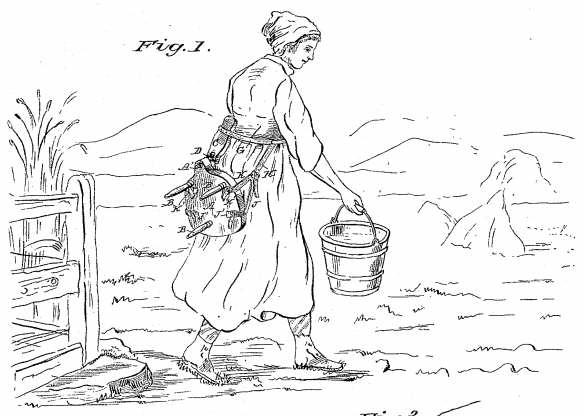Dolphin Rescues
In the summer of 1978, four men rowed a small boat into the deep water off Dassen Island, South Africa, to fish for barracuda. When mist overtook them, they weighed anchor and tried to return to shore, but visibility dropped so quickly that they were soon lost.
Mac Macgregor was in the bow, trying to peer through the mist, when he felt a bump on the right-hand side and discovered two dolphins there, repeatedly forcing the bow to the left, where two more dolphins were swimming.
“I realized that the dolphins’ odd behavior could be significant and shouted to Mr. [Kobus] Stander to steer to the left,” Macgregor said. “Mr. Stander pulled the tiller round wildly and we just managed to graze past the rocks.”
They continued some further distance through the mist, the dolphins continuing to force the prow to the left, and presently they just missed some further rocks — again on the right. “I was getting a strange feeling that we ought to leave our destiny to the dolphins,” Stander said, “since it was clear they had twice prevented us from running on to the rocks.”
The dolphins led the boat for half an hour until it entered calm water, then played around it briefly and disappeared. “When the mist cleared and the houses of Ysterfontein could be discerned, we were speechless,” Stander said. “We had intended going ashore at Dassen Island. We had never dreamed that the dolphins would guide us to Ysterfontein.”
In 1972, when her cabin cruiser sank in the Indian Ocean off Mozambique, a South African woman set out to swim the 25 miles to land. She was trailed by half a dozen sharks, attracted by a cut on her foot. But “as the sharks circled closer … two dolphins appeared at her side,” the New York Times reported. “The young woman, Yvonne Vladislavich, said that the dolphins guarded her against marauding sharks, escorted her as she swam and helped her stay afloat when her strength was failing.” They protected her until she was able to climb onto a buoy, from which she was later rescued.
(“Dolphins Rescue Fishermen,” South African Panorama, August 1978; “South African Reports a Rescue by Dolphins,” New York Times, Sept. 10, 1972.)
In a Word
desticate
v. to squeak like a rat
latrate
v. to bark like a dog
curkle
v. to cry like a quail
barr
v. to utter an elephant’s cry
frantling
n. the noise made by peacocks
“When did the world begin and how?”
I asked a lamb, a goat, a cow:
“What’s it all about and why?”
I asked a hog as he went by:
“Where will the whole thing end and when?”
I asked a duck, a goose, a hen:
And I copied all the answers too,
A quack, a honk, an oink, a moo.
— Robert Clairmont
A Golden March

Draw a circle whose circumference is the golden mean. Choose a point and label it 1, then move clockwise around the circle in steps of arc length 1, labeling the points 2, 3, and so on. At each step, the difference between each pair of adjacent numbers on the circle is a Fibonacci number.
Dairy Carry

Allen Cowan patented this portable milking stool in 1887. From the look of the abstract, he had tested it extensively in actual practice:
In operation, the wearer buckles the waist strap around his or her waist, for this stool is peculiarly adapted for use by women, the stool hanging down behind out of the way, as shown in Fig. l of the drawings, leaving both hands free to carry two pails. As soon as the wearer is ready to sit down to milk, by merely leaning slightly forward, as one sits, the stool swings directly underneath the person, and one can sit down upon it without touching it with the hand.
“If the cow should move away a few feet or commence to kick,” he adds, “the person milking can get up quickly, and catch up the buckets with both hands without paying any attention to the stool, and follow up the cow, sitting down as before.”
Misc
- What time is it at the North Pole?
- The shortest three-syllable word in English is W.
- After the revolution, the French frigate Carmagnole used a guillotine as its figurehead.
- 823502 + 381252 = 8235038125
- PRICES: CRIPES!
- “Conceal a flaw, and the world will imagine the worst.” — Martial
When Montenegro declared independence from Yugoslavia, its top-level domain changed from .yu to .me.
Fare Play
Robert Benchley’s favorite joke, according to Harpo Marx in Harpo Speaks!, 1961:
A man gets on the train with his little boy, and gives the conductor only one ticket. ‘How old’s your kid?’ the conductor says, and the father says he’s four years old. ‘He looks at least twelve to me,’ says the conductor, and the father says, ‘Can I help it if he worries?’
A Drugstore Puzzle

If I buy two toothbrushes in a “buy one, get one free” offer … which one did I buy, and which was free?
(From philosopher Roy Sorensen.)
Fair Warning

While Paulet St. John, Esq., was fox hunting in September 1733, his horse plunged into a chalk pit 25 feet deep. The horse survived and went on to win the Hunters’ Stakes at Winchester the following year.
St. John was so impressed that he erected a monument on Farley Mount, where it stands to this day.
He named the horse “Beware Chalk Pit.”
Plain Talk
A clever Toronto lawyer was deep into a technical argument before the Supreme Court. His position was dependent upon a close reading of the legal text and turned on the letter of the law. Suddenly the chief justice, Beverley McLachlin, leaned forward and asked the counsel if his argument also worked in French. After all, the law is the law in both languages and a loophole in one tends to evaporate in the other. Only an argument of substance stands up. The lawyer had no idea what to reply.
— John Ralston Saul, A Fair Country, 2008


